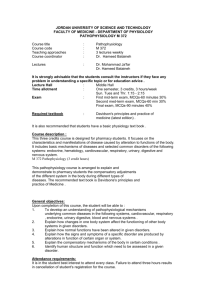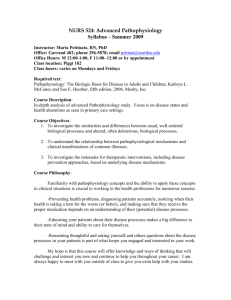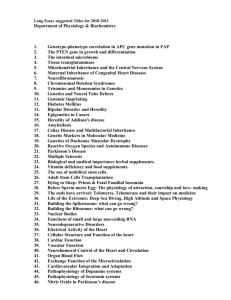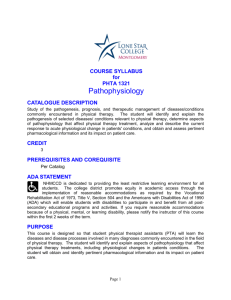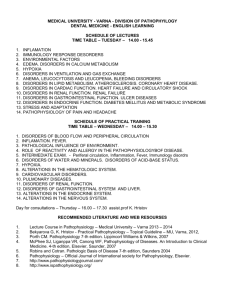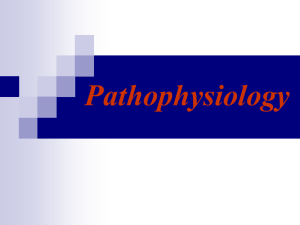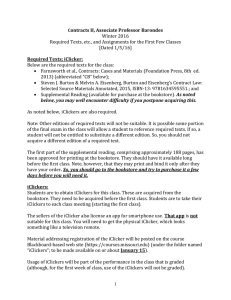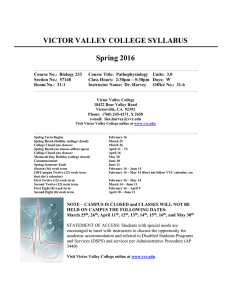Pathophysiology Spring 2015
advertisement
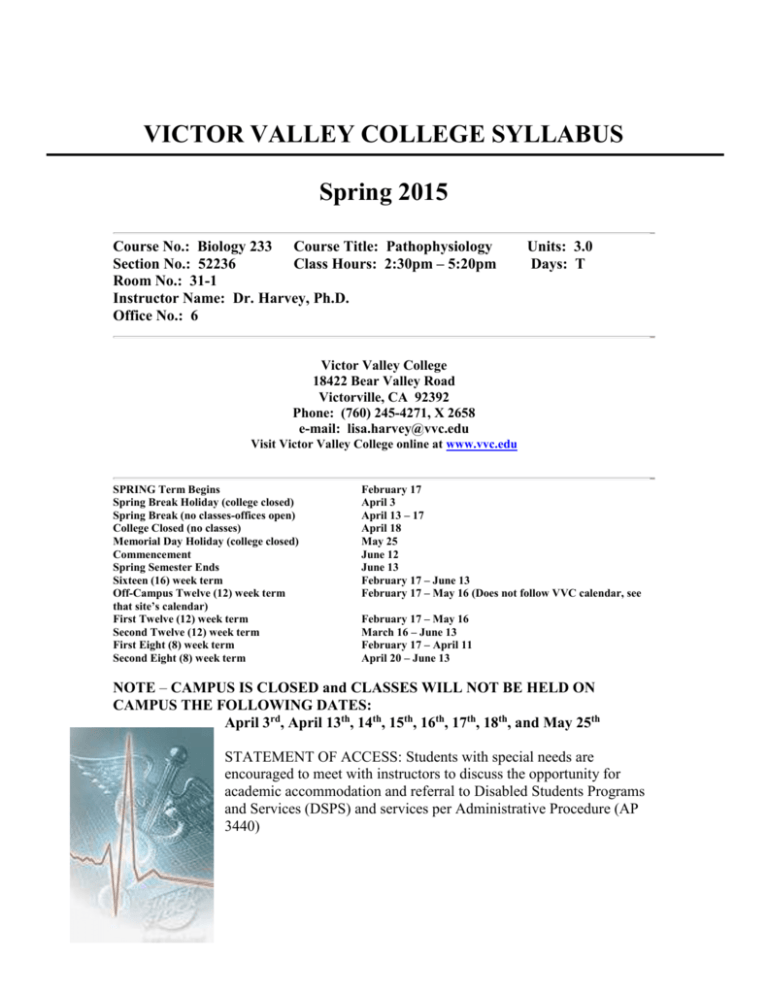
VICTOR VALLEY COLLEGE SYLLABUS Spring 2015 Course No.: Biology 233 Course Title: Pathophysiology Section No.: 52236 Class Hours: 2:30pm – 5:20pm Room No.: 31-1 Instructor Name: Dr. Harvey, Ph.D. Office No.: 6 Units: 3.0 Days: T Victor Valley College 18422 Bear Valley Road Victorville, CA 92392 Phone: (760) 245-4271, X 2658 e-mail: lisa.harvey@vvc.edu Visit Victor Valley College online at www.vvc.edu SPRING Term Begins Spring Break Holiday (college closed) Spring Break (no classes-offices open) College Closed (no classes) Memorial Day Holiday (college closed) Commencement Spring Semester Ends Sixteen (16) week term Off-Campus Twelve (12) week term that site’s calendar) First Twelve (12) week term Second Twelve (12) week term First Eight (8) week term Second Eight (8) week term February 17 April 3 April 13 – 17 April 18 May 25 June 12 June 13 February 17 – June 13 February 17 – May 16 (Does not follow VVC calendar, see February 17 – May 16 March 16 – June 13 February 17 – April 11 April 20 – June 13 NOTE – CAMPUS IS CLOSED and CLASSES WILL NOT BE HELD ON CAMPUS THE FOLLOWING DATES: April 3rd, April 13th, 14th, 15th, 16th, 17th, 18th, and May 25th STATEMENT OF ACCESS: Students with special needs are encouraged to meet with instructors to discuss the opportunity for academic accommodation and referral to Disabled Students Programs and Services (DSPS) and services per Administrative Procedure (AP 3440) 2 [PATHOPHYSIOLOGY SPRING 2015] Course Description This introductory pathophysiology course uses a conceptual approach to introduce pathological mechanisms of altered human states of physiology. Topics include etiology, cellular metabolism, tissue perfusion, tissue alterations, functional changes and agerelated differences when applicable. Specific disease processes are discussed to demonstrate application of the mechanisms. Student Learning Outcomes Upon completion of the course the student can: 1. Relate clinical data to observations of patient status. 2. Read, understand and critically evaluate medical journals, health articles and other forms of data related to pathophysiology. 3. Apply the scientific method when evaluating the validity of information related to pathophysiology. 4. Effectively communicate case studies in pathophysiology through verbal, written and multimedia means. 5. Understand how the various organ systems are interrelated and use this understanding to promote a holistic approach towards the evaluation and treatment of patients. Prerequisites Biology 231 completed with a grade of “C” or better Textbook(s) Text: Pathophysiology: Concepts of Altered Health States, Porth and Matfin. Attendance Attendance is required and is the responsibility of the student. If you do not attend the first class session the instructor will drop you. If you do not plan to continue to attend class you must drop the course to avoid receiving an “F” grade. PLEASE NOTE: Each class session is very important. After missing the equivalent to one lecture and one lab, dismissal from the class will result. This is a very fast pace class and it is highly recommended that you do not miss a class. (Class attendance is not a measure of performance or proficiency. Whether a student is just physically present in the class is not a valid basis for grading. Reference Title 5 Section 55002 of the California Code of Regulations: (A) Grading Policy. The course provides for measurement of student performance in terms of stated course objectives and culminates in a formal, permanently recorded grade based upon uniform standards in accordance with section 55758 of this Division. The grade is based on demonstrated proficiency in the subject matter and the ability to demonstrate that proficiency, at least in part, by means of written expression that may include essays, or, in courses where the curriculum committee deems them to be appropriate, by problem solving exercises or skills demonstrations by students.) [PATHOPHYSIOLOGY SPRING 2015] 3 Withdrawal Policy It is the student’s responsibility to officially withdrawal from this class. DO NOT simply stop coming to class and expect the professor to drop you. Not withdrawing from class may result in an “F” grade for the class. If you take a “W” for the course, no assignments are carried into the next semester. You must repeat the class. Incomplete If a student has completed most of the course (75% or more) with a “C” or better average, but is unable to complete the remainder of the semester due to extenuating circumstances (see student handbook), they may elect to take an incomplete (INC) for the course. You are allowed to make up all missing assignments. An incomplete does NOT allow you to repeat completed assignments. All missed assignments and exams must be completed by the following semester or the grade will revert back to the one they would have earned at the end of this semester. It is the student’s responsibility to initiate the request for an incomplete. This must be completed in writing on a special school form and signed by both the instructor and the student before the end of the semester. Final Grade Your final grade is based on the sum of your scores. You may determine your grade at any time during the course by totaling the points you have accumulated and dividing that total by the number of total points possible. There will be 3 lecture exams worth 150 points each and one final exam also worth 150 points. Each lecture exam will include multiple choice questions and short answer essays. Exam topics will be announced several days in advance. Lecture quizzes will not be announced. No exams or quizzes will be dropped. There will also be case studies done in class and as homework. Any assignment sent home must be typed, handwritten assignments will not be accepted. If you need to make up an exam you must do so on Friday June 5, 2015 at 9:35am in SL-1. There are no exceptions. Missed quizzes cannot be made up. The make-up exam will be a written exam and will not require the iClicker. All grades will be posted on the internet and I will send you e-mail with your password and ID number. You can access your grades at www.eclassinfo.com. Make sure you check your grades frequently for accuracy. Required Supplements iClicker Student Response System – Students must register their iClickers and complete the online training tutorial by the end of the first week of classes so that they are ready to earn points in class using this technology. Without completing these processes, they risk missing the opportunity to gain credit towards their final grades. Students must register their iClickers on the following website:www.iClicker.com. iClickers are required for all students and will be used during class time. Students are required to bring their iClickers to class with them. It is the students’ responsibility to make sure that their iClickers are working and that battery life is 4 [PATHOPHYSIOLOGY SPRING 2015] sufficient. At any time during class periods, students may be asked to respond to questions using their iClickers. The iClicker questions may be administered at the beginning, at the end, or during the lecture with items derived from content learned during the previous class day and/or from assigned textbook readings/assignments for that day or previous classes. Students may not share, borrow, or exchange iClickers with each other or they risk paying the penalty for cheating. Podcasts and Recordings: All classroom lectures may be recorded for posterity. You can get previous lectures at the following address: http://www.bloodhoundsincorporated.com. The percentage scale is as follows (No exceptions): 90 – 100% = A 80 – 89.9% = B 70 – 79.9% = C 60 – 69.9% = D 59.9 and below = F Classroom Policies: Etiquette and Ethics Although extenuating circumstances occur and you must be late to class, do your best to arrive to class on time. If for some reason you cannot arrive at the assigned time, then please enter the classroom quietly and have consideration for other students and the instructor. Because we are also in an intimate classroom setting any extraneous talking is not appreciated during lecture because it is very distracting to your fellow students and even the instructor. Please read the college policy on cheating and plagiarism. Academic dishonesty in any form will not be tolerated, and may result in failure of an exam/assignment, failure of the course or expulsion from the college. If you have any questions regarding dishonesty or are in anyway unclear about the meaning of the college policy, please see me immediately. If Academic Dishonesty is observed in the classroom, the assignment will be given a grade of “F” and the student will be expelled from the class for two days. Children It is the policy of Victor Valley College that children NOT attend class with their parents nor be left unattended on campus while parents attend class. If you qualify, there is a day-care center on campus, if not, please make arrangements for a babysitter. No food or drinks It is school policy that NO food or drinks be allowed in the classroom. Please do not use the small sinks and drawers at the desk as trash receptacles. It is also important to leave all open foodstuffs outside of the classroom, we have a tendency to collect a large herd of ants after awhile. It is not pleasant having them crawl up your pant leg!!! [PATHOPHYSIOLOGY SPRING 2015] 5 PLEASE NOTE: It is the responsibility of every person at each table to make sure the tabletop is clean after the class session is over. It is also the responsibility of every person at the table to check the sink and drawers to make sure there is not trash in either. After a laboratory procedure it is also the responsibility of everyone at the table to make sure the floors are swept and mopped. If you do not make sure your table and the area around your table is clean there will be a 10-point deduction from every person sitting at that table after any or all class sessions. Lecture Schedule A tentative lecture schedule with approximate dates for lecture topics and examinations is included in this syllabus. Materials may be covered at a faster or slower pace, depending upon the circumstances. It is the responsibility of the student to note any and all changes. The chapters indicated for exams should be read by the day of the exam Exams PLEASE TAKE CAREFUL NOTE: During an exam there will be no leaving the classroom for any reason, except with a written Doctor’s excuse. If you leave the classroom your exam is over. 6 [PATHOPHYSIOLOGY SPRING 2015] Tentative Lecture Schedule Date Lecture Topics Feb 17 Nature of Disease Cell Pathology Disorders of the Immune System Inflammation, Tissue Repair and Fever Neoplasia March 24 50, 51 58, 59 41 42 12 - 15 22 - 24, 26 28, 29 Exam 3 Disorders of Gastrointestinal Function Disorders of the Renal System Disorders of the Reproductive System Metabolic and Rheumatic Disorders June 11 8 Exam 2 Disorders of the Hematopoietic System Disorders of the Cardiovascular System Disorders of the Respiratory System May 19 19 Exam 1 Disorders of Motor and Brain Function Disorders of the Musculoskeletal System Disorders of Endocrine Control Diabetes Mellitus and Metabolic Syndrome April 21 Chapter Final Exam 37, 38 32 - 35 44, 46 [PATHOPHYSIOLOGY SPRING 2015] 7 Group Disease Process Presentations: Each student group will develop a PowerPoint presentation, which will be presented in class on a disease process of their own choosing. The presentation will focus on a disease, which may be either a common disease or an obscure disease, as long as the disease is not discussed in detail during classroom lectures (refer to topical content to determine which diseases should be excluded). Any student group that wishes to discuss his/her selection of a disease with the course faculty is welcome to do so. Faculty approval of the chosen disease is required. Required elements for presentation: Powerpoint presentations – 10 minutes to present; maximum length 15 slides (not including Title Slide and Reference Slide) References – minimum of 3 peer-reviewed/evidence-based references (at least 1 journal article; may use textbook as one reference). Sources such as Wikipedia or other non-reviewed websites may not be used; websites relevant to the disease process or treatment may be used (ie: American Cancer Society’s website: http://www.cancer.org/index; Center for Disease Control’s website: http://www.cdc.gov/) Required elements of the presentation include the following: General characteristics of the disease Risk factors (as appropriate) Genetic factors Disease transmission Clinical manifestations Disease progression/course of the disease Prevention, treatment and prognosis Format, style and creativity/visual appeal References 15% 15% 15% 20% 15% 10% 10%
